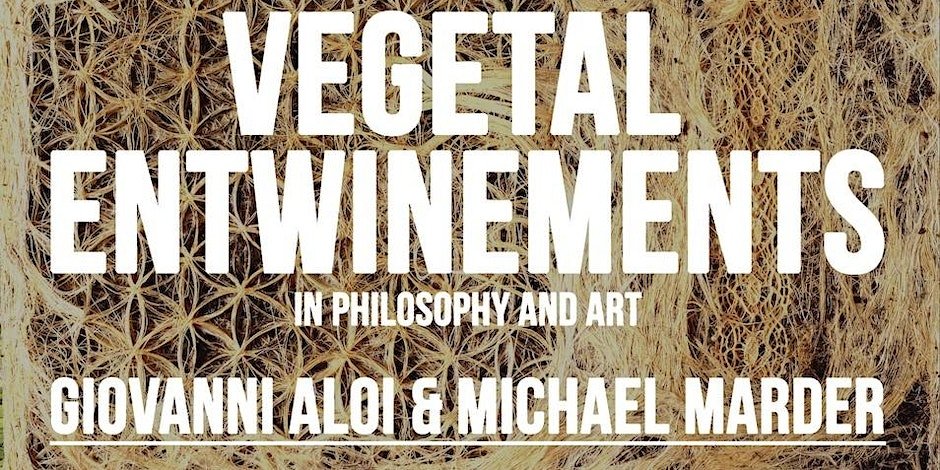Hosted by The Plant Initiative
Free - Optional Donation Recommended
Learn more about plants as they appear in the human imagination in this in depth conversation with leading scholars at this free online event.
Join the editors of Vegetal Entwinements in Philosophy and Art: A Reader, Giovanni Aloi and Michael Marder, with moderator Laura Pustarfi, board member of The Plant Initiative, for a conversation about their important new book. There will be time for questions from the audience following the discussion, and contributors to the book may be joining in as well. This free program will be livestreamed with a link to be sent to participants before the event and will also be recorded and available for viewing online afterwards.
Buy Vegetal Entwinements here.
More about the book:
The first reader in critical plant studies, exploring a rapidly growing multidisciplinary field—the intersection of philosophy with plant science and the visual arts.
In recent years, philosophy and art have testified to how anthropocentrism has culturally impoverished our world, leading to the wide destruction of habitats and ecosystems. In this book, Giovanni Aloi and Michael Marder show that the field of critical plant studies can make an important contribution, offering a slew of possibilities for scientific research, local traditions, Indigenous knowledge, history, geography, anthropology, philosophy, and aesthetics to intersect, inform one another, and lead interdisciplinary and transcultural dialogues.
Vegetal Entwinements in Philosophy and Art considers such topics as the presence of plants in the history of philosophy, the shifting status of plants in various traditions, what it means to make art with growing life-forms, and whether or not plants have moral standing. In an experimental vegetal arrangement, the reader presents some of the most influential writing on plants, philosophy, and the arts, together with provocative new contributions, as well as interviews with groundbreaking contemporary artists whose work has greatly enhanced our appreciation of vegetal being.
Contributors to the book:
Giovanni Aloi, Maria Theresa Alves, Marlene Atleo, Monica Bakke, Baracco + Wright, Emily Blackmer, Jodi Brandt, Teresa Castro, Dan Choffnes, Mark Dion, D. Denenge Duyst-Akpem, Braden Elliott, Monica Gagliano, Elaine Gan, Prudence Gibson, Manuela Infante, Luce Irigaray, Jonathon Keats, Zayaan Khan, Robin Wall Kimmerer, Eduardo Kohn, Wangari Maathai, Stefano Mancuso, Michael Marder, Nathalie Anguezomo Mba Bikoro, Elaine Miller, Samaneh Moafi, Uriel Orlow, Mark Payne, Allegra Pesenti, Špela Petrič, Michael Pollan, Darren Ranco, Nicholas J. Reo, Angela Roothaan, Marcela Salinas, Catriona A. H. Sandilands, Diana Scherer, Elisabeth E. Schussler, Vandana Shiva, Linda Tegg, Krista Tippet, Anthony Trewavas, Alessandra Viola, Eduardo Viveiros de Castro, James H. Wandersee, Lois Weinberger, Kyle Whyte, David Wood, Anicka Yi
Dr. Giovanni Aloi is an author, educator, and curator specializing in the representation of nature and the environment in art. He is the Editor in Chief of Antennae: The Journal of Nature in Visual Culture. Aloi is the author of Art & Animals (2011), Speculative Taxidermy: Natural History, Animal Surfaces, and Art in the Anthropocene (2018), Why Look at Plants? The Vegetal Emergence in Contemporary Art (2019), Lucian Freud – Herbarium (2019), and Posthumanism in Art and Science (2020) and Estado Vegetal (2023). Aloi has contributed to BBC radio programs, worked at Whitechapel Art Gallery and Tate Galleries in London, and currently is USA correspondent for Esse Magazine. Aloi has curated exhibitions in the US and Europe and is co-editor of the University of Minnesota Press series Art after Nature. For more information, consult his website www.aloi.info.
Dr. Michael Marder is IKERBASQUE Research Professor in the Department of Philosophy at the University of the Basque Country (UPV-EHU), Vitoria-Gasteiz, Spain. His writings span the fields of ecological theory, phenomenology, and political thought. He is the author of numerous scientific articles and monographs, including Plant-Thinking (2013); Phenomena—Critique—Logos (2014); The Philosopher’s Plant (2014); Dust (2016), Energy Dreams (2017), Heidegger (2018), Political Categories (2019), Pyropolitics (2015, 2020); Dump Philosophy (2020); Hegel's Energy (2021); Green Mass (2021), Philosophy for Passengers (2022), The Phoenix Complex (2023), Time Is a Plant (2023), and, with Edward S. Casey, The Place of Plants (2023). For more information, consult his website michaelmarder.org.
There will be time for questions from the audience following the discussion. This free program will be livestreamed on Zoom with a link to be sent to participants before the event and will also be recorded and available for viewing online afterwards.

